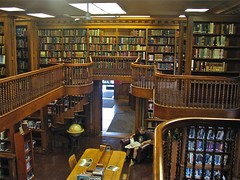The idea of curling up with a good book has increasingly come to mean flipping on an e-reader, not flipping through the pages of a leather-bound novel in a book-lined room.Read the whole thing (and if the Journal's Web site wants you to subscribe, remember that Google is your friend). As I perused this piece, I realized that I've neglected to mention The Middle Shelf on this blog of late. Now, The Middle Shelf's purpose might seem a bit abstruse to newcomers. "You say you like to read and write books, right? So why in the world do you restrict yourself to a single bookshelf full of fiction titles that you'll pick up again and again? It seems counterintuitive."
Yet the home library is on the rise, having become something of a cerebral status symbol. Affluent homeowners are buying quality books in quantity to amass collections for private personal libraries. These rooms are as much aesthetic set pieces and public displays of intelligence as they are quiet spaces to reflect and retreat. Some people are also seeking the services of experts to help pull together notable collections or to advise on the look, feel and content of their home libraries. ...
Juniper Books' collection-development service attracts people who want a library but haven't had the time or inclination to amass a collection of books. "Part of the desire [to create libraries] is for people to look smart and well-read, and part of it is the quest for some great knowledge in this electronic age," says Thatcher Wine, owner of Juniper Books, in Boulder, Colo. The company's collection-development business doubled last year to a few hundred clients. It charges by the linear foot -- or by the individual book -- with most libraries in the $3,000 to $100,000 range.
Perhaps it does. But consider what purpose books serve. They exist because an author has something he wants to communicate. It may be silly or serious, puerile or profound, but the only way you'll find out is if you pick up the blessed thing and actually read it. And while I agree that every product is a combination of physical, image and service characteristics (thank you, half-finished MBA degree), books still exist for primary purpose of reading, not for padding bookshelves or consultants' wallets.
Of course, I'm not suggesting that everyone needs to adopt The Middle Shelf philosophy. Feel free to buy as many books as you like. Just make sure you're reading them along the way.
(Picture: CC 2010 by origamidon)



3 comments:
I also find bookshelves to be a sort of mating call--which is why, in addition to my wife's and my comfortably overstuffed library full of books we've read (probably only 1.3 times per book, on average, which is the downside of having a library of 1,000 books or so) we have a smaller, overstuffed bookshelf full of our most valued recommendations.
I have no problem with books as a status symbol, as long as the status is accurate and wholesome. Ours says "nerds who will gladly loan you books of SF, fantasy, or theology, highbrow, middlebrow, and low brow, without judgment. Unless you want Ayn Rand or Stephenie Meyer, you monstrous phillistine."
Unfortunately, most people's status symbols exist entirely to set their status at "better than thou."
Sure, literary status symbols are fine as long as you're reading them. And it sounds like you and your wife are. Did you ever read this post? It still makes me shudder.
Agreed.
I sometimes go back and forth on my own library, with the question "am I going to read all of these books again?" But I *do* re-read, and I definitely loan out books, and sometimes that one odd book you read once and put back on the shelf is the perfect book to loan to friend X of the truly eclectic tastes.
And if I buy a book intending to read it, and ultimately don't--eventually I sell it back. Such is the gamble of the local used bookstore.
Post a Comment